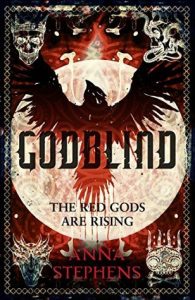Godblind by Anna Stephens
 Anna Stephens’ Godblind features a cast of GRRMartin-ian proportions, though I leave it to the reader to discover if they are as vulnerable to the winds and whims of authorial plot development as the various Snowflakes in A Song of Fire and Ice. Certainly Stephens makes her characters suffer (and her readers wince.)
Anna Stephens’ Godblind features a cast of GRRMartin-ian proportions, though I leave it to the reader to discover if they are as vulnerable to the winds and whims of authorial plot development as the various Snowflakes in A Song of Fire and Ice. Certainly Stephens makes her characters suffer (and her readers wince.)
Stephens has imagined a world where gods are real, but the bad ones are banished while the good one’s belief in allowing free will seems to be – for a while at least – an abdication of divine responsibility. In that gap between a pantheon’s heaven and hell, it is substantially left to ordinary people to show their venality or their heroism.
Stephens writes in a brisk style, where the flips between points of view add a cinematic sense of pace and urgency. The complex plot is illuminated through the eyes of diverse characters, and in one case eyes of diverse colours.
Within the array of characters, each offering different camera angles on a developing crisis, it is hard to pick out or rank the many protagonists and antagonists. The chapter headings helpfully identify the Point of View Character by name – again in a nod to GRRMartin – although the chapters are generally far shorter than Martin’s giving a sequence of easily digestible chunks as the viewer/reader’s attention is snatched from one place and person to another, following several parallel timelines.
Some characters bloodily announce themselves as antagonists; disembowelling a defenceless woman is a decidedly unheroic act, no matter in which god’s name you do the deed. Others wait to show their true colours, even though the reader has ridden in their head for many a page or chapter, and that makes for an intriguing story and more than a few “Oooohhhh!” moments.
In such a rich and varied cast I guess Dom and Rillirin were my favourite. The former a Wolf soldier and calestar given to “knowings” – where the divine will give him a cryptic glimpse of the future and a massive headache to boot. Given the description of a knowing being heralded by a pain behind one eye I wondered if an experience of migraine headaches had perhaps inspired the concept! As for Rillirin – a brutalised slave who rose up bloodily against her abusers – what’s not to like!
There is a welcome diversity within Stephens cast of main characters and supporting roles, though without implying a utopia of perfect equality. While women in the wolf tribes such as Dalli Shortspear, and Sarilla the archer are welcomed alongside the men in battle, the path to promotion for female soldiers in the Rylorian ranks is still strewn with prejudice. Captain Tara Carter having to be twice as good before her colleagues will think her half their worth. The wolf tribes are more open to a range of sexualities as well – in contrast to archaic Rylorian laws – which adds an extra tension to one of several romantic subplots.
The story weaves gods and politics in a heady mix, the father and son pairing of Durdil and Mace Koridam fighting palace intrigue and a mass of invaders respectively. There was one moment – when communication by carrier pigeon felt like a medieval version of twitter, with half a dozen pigeons seen flying from one tower, to convey a more lengthy message than the norm – a carrier pigeon thread if you would.

Most of Stephen’s protagonist characters either start or end coupled up – not a bad reflection of real life – but this fear for the two halves of so many sundered partnerships adds an additional dimension to the long tangle of bloody visceral struggles with which the book ends.
There were a few points where the plot required me to believe some conspirators were really rather stupid. When Edward II was murdered with a red-hot poker, the assassins reputedly used a hallow marrow bone to open his anus so the murder weapon could leave no impression on the body apart from the long echoing howls around Berkley castle and the stricken expression on the corpse’s face. External appearances at least supported the view that Edward II had died a nasty but natural death.
Stephens’ conspirators are somewhat clumsier in their attempt to cover up an eyewatering, leg crossing, knee clenching act of murder even more horrific than poor Edward II’s demise. I mean trees can do terrible things to a man – but even the most vicious dog wrestling branch would struggle to have wrought that kind of ruin.

Ruby Lawrence demonstrating how the conspirators’ account might actually have worked
Stephens writing gives her characters and earthy sense of humour – such as this line from inside Galtas’s head.
Still in love with your own pompous voice echoing out of your arsehole. I’ve done farts that had more substance.
There are other lines that echo more contemporary themes:
“You’re a free woman, Rillirin… and free women can accept drinks from free men without it requiring payment of any sort.”
The complex threads and looming disaster mean this book is clearly the opening of a trilogy. The extended denouement is full of blood and action as war comes almost simultaneously to all our scattered friends and foes. However, as the last page is turned we are left with more questions than answers, with our favourite characters perched on a variety of different precipices – above and below ground, psychological and physical.
There will be a reckoning I am sure, but for many of the antagonists this volume is a tally chart of their crimes, with little sign yet of punishment. But at the end, as the reality of divine intervention makes its mark on Dom and others, we get to know the meaning of what it is to be Godblind.
